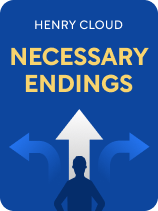

This article is an excerpt from the Shortform book guide to "Necessary Endings" by Henry Cloud. Shortform has the world's best summaries and analyses of books you should be reading.
Like this article? Sign up for a free trial here.
What are the most insightful quotes from Necessary Endings? What role do endings play in your life?
Necessary Endings by Henry Cloud is about learning to break free from the relationships and situations that are holding you back. Cloud asserts that many people suffer needlessly in both business and in their personal lives because of their inability to exit these types of situations.
Keep reading for the best Necessary Endings quotes that summarize the main ideas of the book.
Quotes From Necessary Endings
If you’ve ever struggled to leave a lousy job or a toxic relationship, psychologist Henry Cloud has advice for you. In Necessary Endings, Cloud argues that pulling out of a bad situation is often the best way to move forward with your life. According to Cloud, we should view the endings in our lives positively, as those endings enable us to begin to live the lives we want. Cloud offers strategies for assessing the various situations in your life, determining which of them need to end, and making sure that your endings stick.
Below we’ve compiled three Necessary Endings quotes that perfectly encapture Cloud’s advice.
“You cannot fix people who will not take feedback, because from their perspective, they do not have a problem.”
According to Cloud, people can generally be sorted into three categories based on their character. There are responsible people, irresponsible people, and dangerous people. Cloud offers different strategies for dealing with each type of person. (Cloud notes that people are too complicated to truly fall into three simple categories; however, these three categories can still be a useful heuristic for determining which relationships to end.)
1) Responsible people (Cloud refers to them as “wise people”): Responsible people are characterized by their ability to take ownership of their actions. They’re able to admit and apologize when their mistakes have hurt others, and they readily incorporate feedback and change unwanted behaviors.
2) Irresponsible people (Cloud refers to them as “fools”): As you might expect, irresponsible people are in many ways the polar opposites of responsible people. Irresponsible people are unable to take responsibility for their actions, instead finding an external factor to blame for any mistakes they make. When pressed about their behaviors, they’ll deflect or become heated and defensive.
When dealing with irresponsible people, it doesn’t always help to communicate directly about problem behaviors. Instead of critiquing specific misbehaviors, Cloud recommends calling out their overall inability to accept responsibility for their action. Point out to irresponsible people that they always find someone or something else to blame when things go wrong—this can sometimes help them change their patterns. Setting consequences also works well with irresponsible people, as it forces them to bear the weight of their own mistakes, which encourages them to change their behavior.
For example, suppose you’re struggling with an employee who habitually misses deadlines. Not only is this employee always behind schedule, they always have an excuse, always finding something or someone else to blame for their lateness. According to Cloud, trying to talk to them about their time management will be ineffective, as they’ll only continue to deflect responsibility. Instead, point out to the employee that they’re never accountable for their mistakes, and that their pattern of making excuses makes it difficult to manage them. By making them aware of their cycles of irresponsibility, you may help them begin the process of breaking those cycles.
It may not always be possible to improve relationships with irresponsible people. If you’ve tried communicating and setting consequences to no avail, Cloud recommends putting up boundaries to protect yourself. In some cases, this might mean bringing the relationship to an end.
3) Dangerous people (Cloud refers to them as “evil people”): Dangerous people are completely unlike the first two groups. Whereas both responsible and irresponsible people may sometimes cause harm by accident, dangerous people intend to harm others with their words and their actions. They are unsafe to be around.
None of the strategies we have listed are effective in dealing with dangerous people. According to Cloud, nothing you can do will change their behavior. Instead, end any and all relationships with dangerous people, and do your best to keep away from them. Cloud notes that deterrents, such as legal actions or calls to law enforcement, can be effective in keeping dangerous people away.
“Failing well means ending something that is not working and choosing to do something else better.”
According to Cloud, some situations are obviously beyond saving. The best thing you can do in those situations is to end them immediately, to free up resources that would be better utilized elsewhere.
For example, imagine you work at a tech company that still devotes a significant chunk of its resources to manufacturing VCRs, despite the fact that they haven’t sold well in over a decade. Your best course of action would be to end VCR production immediately, and use the budget to improve and market your other products.
Cloud notes that to identify the three types of unproductive situations, you must have clear goals in mind. If you don’t set goals and standards for your endeavors, you’ll be unable to measure whether a situation is good, great, mediocre, or a lost cause.
Suppose you open a restaurant that barely manages to break even in its first six months. Depending on your goals, you might view this outcome as either a success or failure. If your goal was for the restaurant to stay open and avoid losing money as so many new restaurants do, you’d consider the situation a great success. However, if your goal was to consistently pay your mortgage with the restaurant’s earnings, the situation is a failure.
Lastly, when assessing any situation, consider whether it depletes resources faster than it brings them in. Situations that require a large investment to produce a minimal return should be ended, as they are unlikely to be productive in the long run.
“Without the ability to end things, people stay stuck, never becoming who they are meant to be, never accomplishing all that their talents and abilities should afford them.”
According to Cloud, endings are a natural part of life. He notes that in nature, cycles that include both endings and new beginnings are the norm—often, the end of a particular season or stage of life is what makes the new beginning possible. He suggests that keeping in mind the role of endings in nature may make it easier for you to accept their role in your life.
For example, consider wildfires. Most often triggered by lightning, wildfires are a natural ending. They’re capable of bringing an end to much of the plant and animal life of large areas. At first glance, wildfires might seem to be wholly destructive. However, areas razed by these fires tend to be especially fertile and hospitable for rare species of plants and animals. In fact, there are some seeds that only germinate in the wake of wildfires—new life that wouldn’t have been possible without an ending coming first.
(Shortform note: While endings are a natural, beneficial part of life, modern society tends to be ending-averse, especially when endings involve death. However, in Happy, Derren Brown argues that it can be liberating to view death in a more positive light. Brown believes that accepting death can help you live a regret-free life—he asserts that maintaining awareness of your mortality can help motivate you to make the most of the present.)

———End of Preview———
Like what you just read? Read the rest of the world's best book summary and analysis of Henry Cloud's "Necessary Endings" at Shortform.
Here's what you'll find in our full Necessary Endings summary:
- That pulling out of a bad situation is the best way to move forward in life
- How to assess which situations and relationships need to end
- How to make sure that your endings stick






